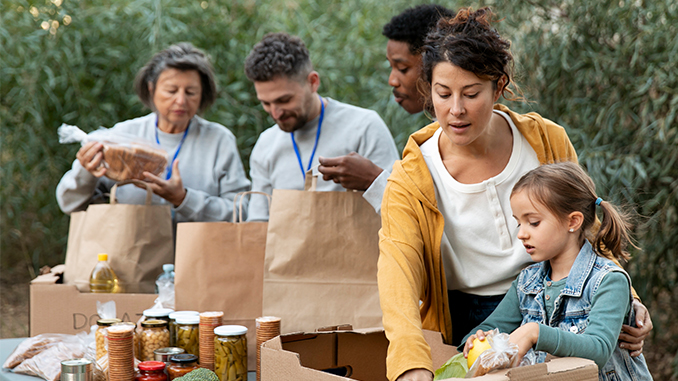
Here’s how volunteering can benefit the community and our well-being and health.
Published: November 19, 2024
By: Victoria Mikota
Whether you’re serving up soup at a soup kitchen, providing extra TLC to dogs and cats at the animal shelter, or helping your kiddos’ teacher wrangle five- and six-year olds, volunteering is a great way to make the world a better place. Did you know that volunteering not only helps others, but is also good for you too? Studies have shown that volunteering makes people feel good and leads to better physical and mental well-being. Millions of Americans volunteer every year in animal shelters, food banks, schools, clubs, community gardens, museums, and other organizations. Here’s how volunteering benefits not only the community around us, but also our well-being and health.
Volunteering Connects Us to Each Other
Being a part of something bigger is one of the best parts about volunteering. While volunteering largely affects our communities around us, it also helps us connect with our community, broaden our support network, and expose us to people with common interests. Volunteers working on a community project are all focused on achieving a common goal together––which creates an environment of closeness and satisfaction––regardless of age, sex, religion, or other demographic factors.
Volunteering Improves Heart Health
According to Jeffrey Buff, a professor of gerontology at UMass Boston, “Compared to non-volunteers, volunteers have less depression, less anxiety, higher self-esteem, higher life satisfaction, greater happiness, and a greater sense of meaning of life.” In addition, a separate study was conducted at Carnegie Mellon University. In this study, older adult volunteers who volunteered for at least 200 hours annually decreased their risk of high blood pressure by 40 percent, thus lowering their risk of stroke, heart disease, and other health problems.
Volunteering Improves Mental Health
The mental health benefits of volunteering are substantial. Volunteering helps people to distract themselves in a positive way from stress, grief, and worry. In fact, being a volunteer can help enhance one’s sense of purpose and relieve chronic stress–which could be especially important for older people. Carnegie Mellon researcher Rodlescia S. Sneed writes, “As people get older, social transitions like retirement, bereavement, and the departure of children from the home often leave older adults with fewer natural opportunities for social interaction.” Participating in volunteer opportunities can help provide older people with social connections that they may not have otherwise.
In addition, volunteering can alleviate loneliness, reduce depression, and increase positive thinking.
Volunteering Makes Us Happier
Human beings are hard-wired to give to others. In fact, researchers have discovered that being helpful to others delivers immense pleasure. Those who volunteer regularly are found to be happier, more empathetic, and feel a sense of self and pride.
Get Out and Volunteer
While volunteering is a great opportunity to give back to your community, it’s also a great way to reconnect with yourself! Volunteering has a plethora of benefits from enhanced mental health to overall well-being. Making time to serve others is a great way to give back to your community and yourself. So get out there and volunteer––your heart, mind, and community will thank you.
